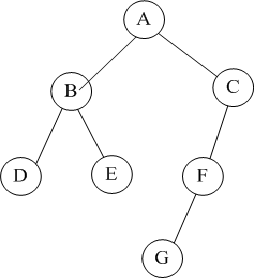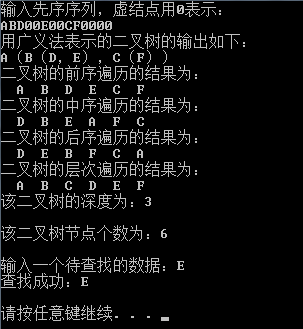如图所示的二叉树:
#include <stdio.h> #include <malloc.h> #include <stdlib.h> #define MAXNODE 10 struct node { char data; struct node *lchild; struct node *rchild; }; struct node *CreatBTree() //采用递归法,创建二叉树 { struct node *topNode; //定义1个指向结构体的指针 char ch; ch=getchar(); //getchar函数是从输入缓冲区里读出最开头的那个字符的,然后把最先的那个字符删掉 if(ch=='0') topNode=NULL; else { topNode=(struct node *)malloc(sizeof(struct node)); topNode->data=ch; topNode->lchild=CreatBTree();//创建左子树 topNode->rchild=CreatBTree();//创建右子树 } return(topNode); } void printListBTree(struct node *topNode) //广义表示法输出二叉树 { if(topNode!=NULL) { printf("%c",topNode->data); if((topNode->lchild!=NULL)||(topNode->rchild!=NULL)) { printf("("); printListBTree(topNode->lchild); if(topNode->rchild!=NULL) printf(","); printListBTree(topNode->rchild); printf(")"); } } } void preorder(struct node *topNode) //前序遍历 { if(topNode!=NULL) { printf("%3c",topNode->data); preorder(topNode->lchild); preorder(topNode->rchild); } } void Inorder(struct node *topNode) //中序遍历 { if(topNode!=NULL) { Inorder(topNode->lchild); printf("%3c",topNode->data); Inorder(topNode->rchild); } } void postorder(struct node *topNode) //后序遍历 { if(topNode!=NULL) { postorder(topNode->lchild); postorder(topNode->rchild); printf("%3c",topNode->data); } } //层次遍历时,设置一个队列,遍历从根节点开始 //首先将根节点指针入队列,然后从队列取出一个元素,每取出一个元素进行如下操作: //(1)访问该元素所指节点 //(2)若该元素所指节点的左右孩子节点非空,则将该元素所指节点的左孩子指针和右孩子指针顺序入队。不断进行该过程,当队列为空时,遍历结束! void levelorder(struct node *topNode) //层次遍历 { struct node *queue[MAXNODE]; int front,rear; if(topNode==NULL) return; front=-1; rear=0; queue[rear]=topNode; while(front!=rear) { front++; printf("%3c",queue[front]->data); //访问队首节点 if(queue[front]->lchild!=NULL) //将队首节点的左孩子节点入队 { rear++; queue[rear]=queue[front]->lchild; } if(queue[front]->rchild!=NULL) //将队首节点的右孩子节点入队 { rear++; queue[rear]=queue[front]->rchild; } } } //在知道根节点的二叉树中查找数据元素x;查找成功返回该节点的指针,查找失败返回空指针 struct node *Search(struct node *topNode,char x) //在二叉树中查找给定数据 { struct node *p; if(topNode==NULL) return NULL; else { if(topNode->data==x) return topNode; else { if(p=Search(topNode->lchild,x)) return p; if(p=Search(topNode->rchild,x)) return p; } } return NULL; } int TreeDepth(struct node *topNode) //计算二叉树的深度 { int depleft,depright; if(topNode==NULL) { return 0; } else { depleft=TreeDepth(topNode->lchild); depright=TreeDepth(topNode->rchild); if(depleft>depright) { return depleft+1; } else { return depright+1; } } } int countNode(struct node *topNode) //计算二叉树节点个数 { int count; int lnode_num,rnode_num; if(topNode==NULL) count=0; else { lnode_num=countNode(topNode->lchild); rnode_num=countNode(topNode->rchild); count=lnode_num+rnode_num+1; } return count; } void main() { char xx; struct node *topNode=NULL; struct node *BNode; int tree_depth; //变量定义为二叉树的深度 int sum_node; //变量定义为二叉树节点个数 printf("输入先序序列,虚结点用0表示: "); topNode=CreatBTree(); printf("用广义法表示的二叉树的输出如下: "); printListBTree(topNode); printf(" 二叉树的前序遍历的结果为: "); preorder(topNode); printf(" 二叉树的中序遍历的结果为: "); Inorder(topNode); printf(" 二叉树的后序遍历的结果为: "); postorder(topNode); printf(" 二叉树的层次遍历的结果为: "); levelorder(topNode); printf(" 该二叉树的深度为:"); tree_depth=TreeDepth(topNode); printf("%d ",tree_depth); printf(" 该二叉树节点个数为:"); sum_node=countNode(topNode); printf("%d ",sum_node); printf(" "); printf("输入一个待查找的数据:"); fflush(stdin); //清空输入缓冲区 scanf("%c",&xx); BNode=Search(topNode,xx); if(BNode) printf("查找成功:%c ",*BNode); else printf("查找失败! "); printf(" "); system("pause"); }
结果显示:

